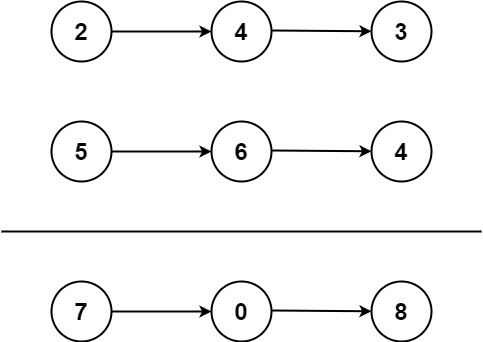English
2. Add Two Numbers 
Problem Statement:
You are given two non-empty linked lists representing two non-negative integers. The digits are stored in reverse order, and each of their nodes contains a single digit. Add the two numbers and return the sum as a linked list.
You may assume the two numbers do not contain any leading zero, except the number 0 itself.
Example 1:

Input: l1 = [2,4,3], l2 = [5,6,4]
Output: [7,0,8]
Explanation: 342 + 465 = 807.
Example 2:
Input: l1 = [0], l2 = [0]
Output: [0]
Example 3:
Input: l1 = [9,9,9,9,9,9,9], l2 = [9,9,9,9]
Output: [8,9,9,9,0,0,0,1]
Constraints:
- The number of nodes in each linked list is in the range
[1, 100]. 0 <= Node.val <= 9- It is guaranteed that the list represents a number that does not have leading zeros.
Solution:
java
public ListNode addTwoNumbers(ListNode a, ListNode b) {
ListNode dummy = new ListNode(0),
tail = dummy;
int carry = 0;
while (a != null || b != null) {
int x = (a != null) ? a.val : 0,
y = (b != null) ? b.val : 0,
sum = carry + x + y;
carry = sum / 10;
tail.next = new ListNode(sum % 10);
tail = tail.next;
if (a != null)
a = a.next;
if (b != null)
b = b.next;
}
if (carry > 0)
tail.next = new ListNode(carry);
return dummy.next;
}
...
